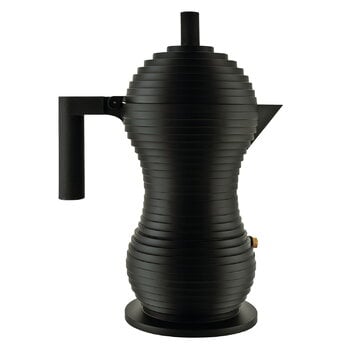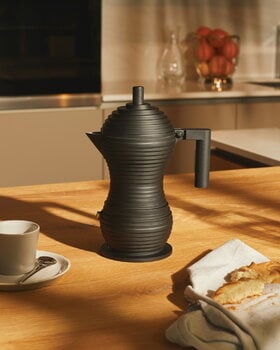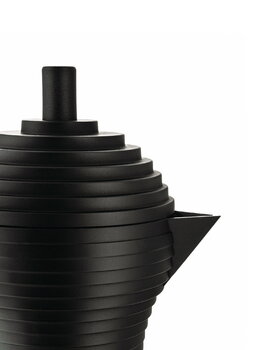Alessi’s Pulcina espresso maker combines Michele de Lucchi’s unique aesthetic style with high-quality Italian design. Launched in 2015, Pulcina has an eye-catching, flowing shape consisting of small layers and complemented with a bold, angular handle. The espresso maker’s innovative design stops the brewing exactly at the right time to prevent your coffee from getting a bitter aftertaste. Pulcina is Italian for chick, referring to the shape of the small, drip-free spout.
Pulcina espresso coffee maker, 6 cups, black
Alessi
Description
Alessi’s Pulcina espresso maker combines Michele de Lucchi’s unique aesthetic style with high-quality Italian design. Launched in 2015, Pulcina has an eye-catching, flowing shape consisting of small layers and complemented with a bold, angular handle. The espresso maker’s innovative design stops the brewing exactly at the right time to prevent your coffee from getting a bitter aftertaste. Pulcina is Italian for chick, referring to the shape of the small, drip-free spout.
Product details (8)
- Material
- Aluminum
- Colour
- Black
- Width
- 12 cm
- Depth
- 20 cm
- Height
- 26 cm
- Capacity
- 30 cl
- Notes
- Not suitable for induction hobs.
- Care instructions
- Wash with hot running water and a non-abrasive cloth. Do not wash in the dishwasher.
- Product ID
Designer
Michele De Lucchi was born in 1951 in Ferrara, Italy. He studied architecture in Florence. After his graduation De Lucchi was a part of anti-design movement called Radical.
De Lucchi has designed lamps and furnishings for the most renewed Italian and European companies. He has received a Compasso D'oro design award together with Giancarlo Fassina for their well-known Tolomeo series of lamps.
View all productsReviews (1)
1
Based on 1 reviews
-
R
Raija K
Espoo, Finland
En voinut testata, koska ei toiminut induktioliedellä.
F
FinnishDesignShop.fi
Hei, harmillista kuulla. Tuotetiedoissa on mainittu "Ei sovellu induktioliedelle." harmi että tämä mennyt ohi tilatessa. Mukavaa uutta viikkoa kuitenkin!338 days ago
Sustainability
The Product Sustainability Framework, our criteria of sustainable design, helps you find the most sustainable products in our selection. Read below which sustainability criteria this product has met.
Working conditions & labour 8/9
-
Equal opportunities for all employees
-
Commitment to UN Global Compact, fair compensation for all employees
-
Corporate responsibility requirements defined and communicated for suppliers
-
Systematic work for improved inclusion and well-being in the workplace
-
Transparent supply chain
-
Suppliers' compliance to a code of conduct ensured
-
Direct suppliers audited and certified
-
Compliance to the UN Guiding Principles on Business and Human Rights ensured in the supply chain
-
Support for community involvement in the supply chain
Eco-friendly production 8/9
-
Fair and resource-wise water-use in production
-
No incineration or landfilling of returned items
-
No use of endangered species as materials
-
No direct environmental emissions or waste (excl. GHGs) from production
-
The sustainability of direct suppliers' production is addressed and monitored
-
Production and material sourcing that respect biodiversity, animal rights, and natural ecosystems
-
Material-efficient and ecological packaging
-
No potentially harmful chemicals used in own production
-
Positive impact on nature’s well-being through operations that regenerate natural ecosystems
Climate impact 4/8
-
Company's direct greenhouse gas emissions identified and commitment to reduction
-
Product's carbon impact identified and commitment to reduction
-
Guidance on energy- and eco-efficient use of the product
-
Carbon footprint of the product calculated and goals set to reduce it
-
Contribution to climate initiatives beyond the brand’s direct operations
-
Low-carbon or compensated transportation
-
100 % renewable energy in own production and operations
-
Carbon neutral or carbon negative product
Sustainable materials 5/6
-
Sustainable and long-lasting material choices
-
No harmful or hazardous substances
-
Responsible raw material sourcing and production
-
Materials suited for circularity: monomaterials, recyclable finishings, renewable or recycled contents etc.
-
Ecological materials: natural, biodegradable, recyclable or recycled contents
-
Outstanding materials in terms of innovativeness, responsibility, sustainability and circularity: local production or sourcing, 100 % recycled content, C2C-certification etc.
Circular design 5/5
-
High aesthetic quality promoting long-term use of the product
-
Technically durable product design and material choices
-
Design for enduring life-long quality
-
Design and support for product maintenance, repair and upgradability
-
Innovative circular design solutions: circular service system, resale platform, remanufacturing, collection of used products, etc.









